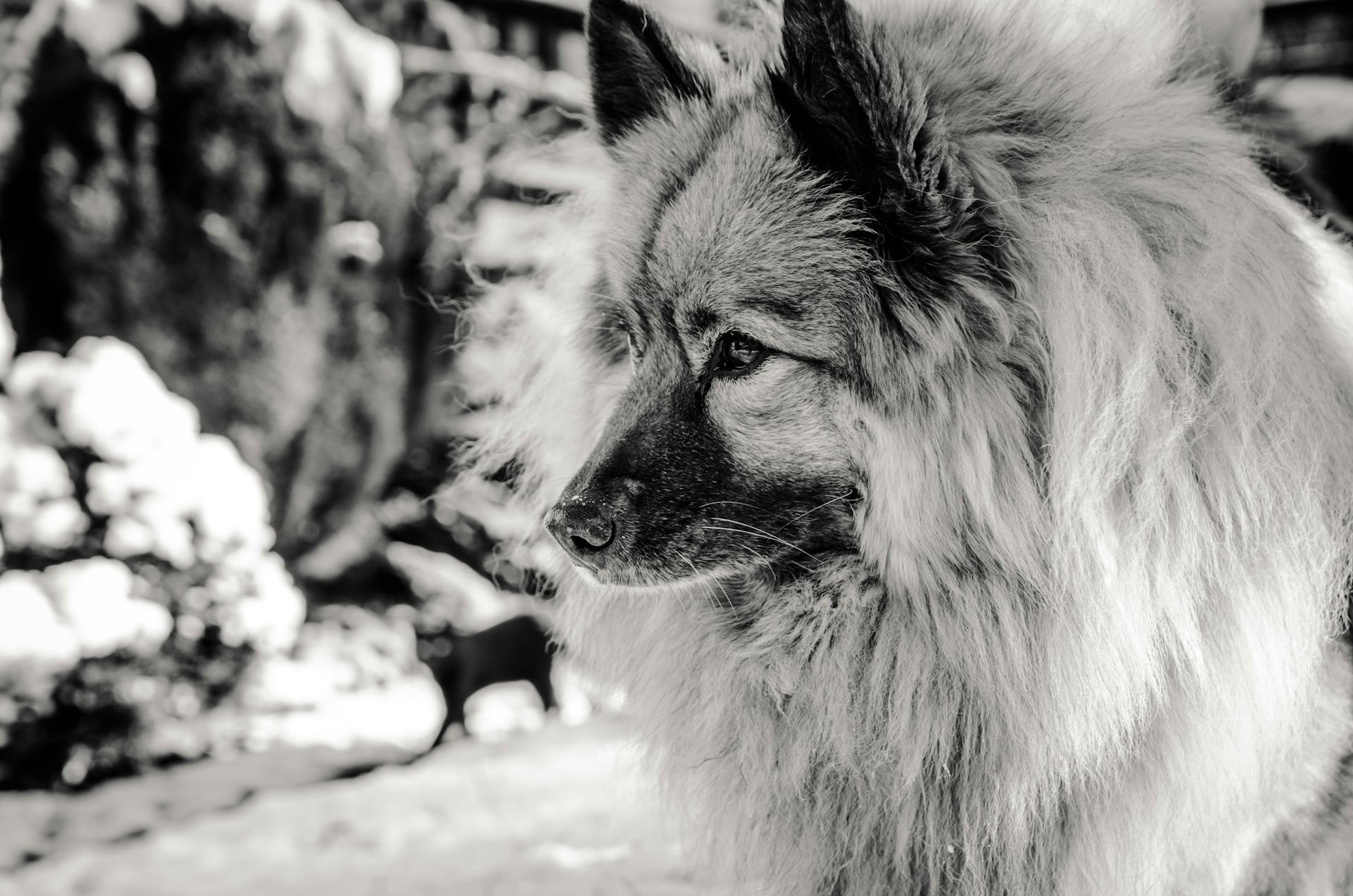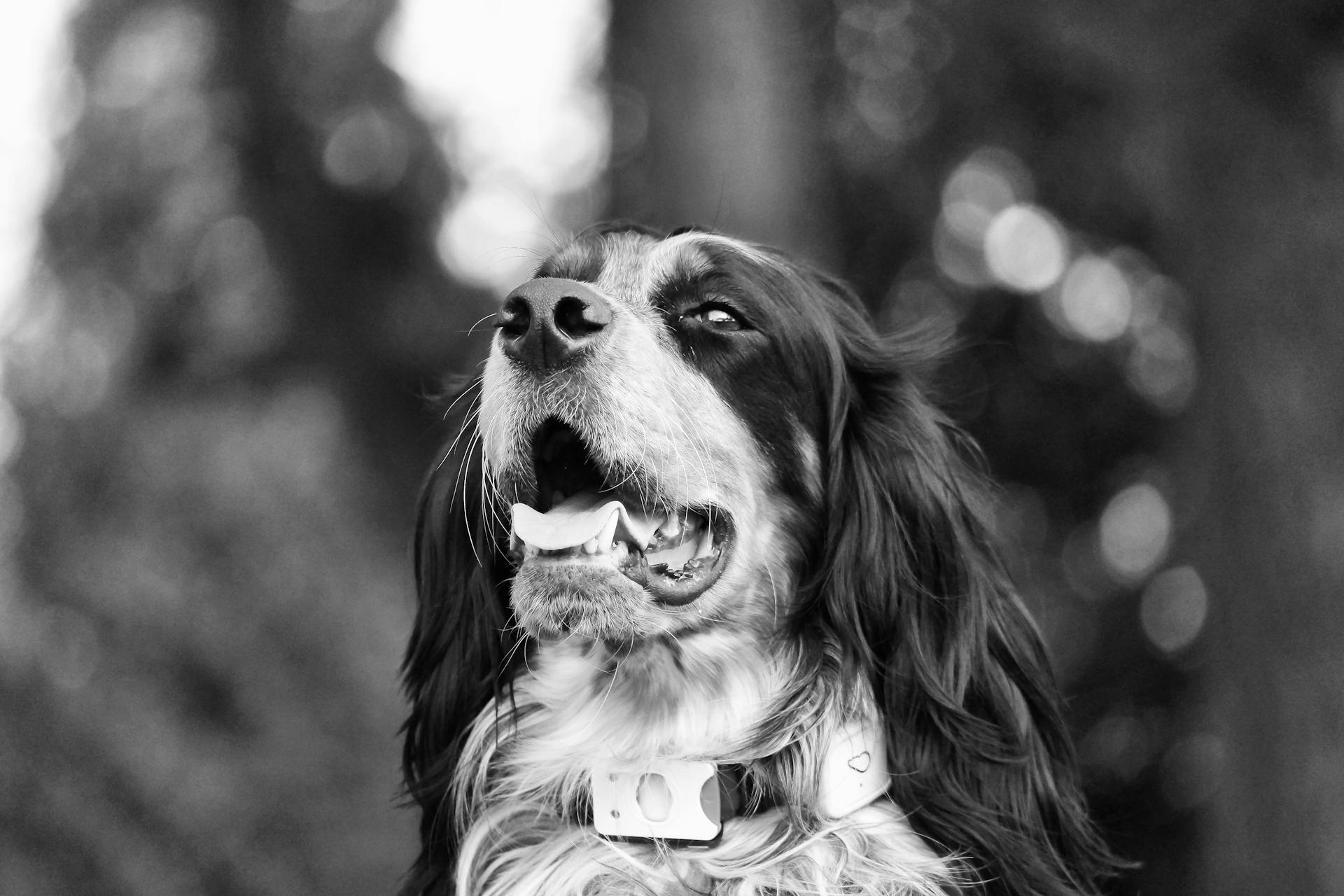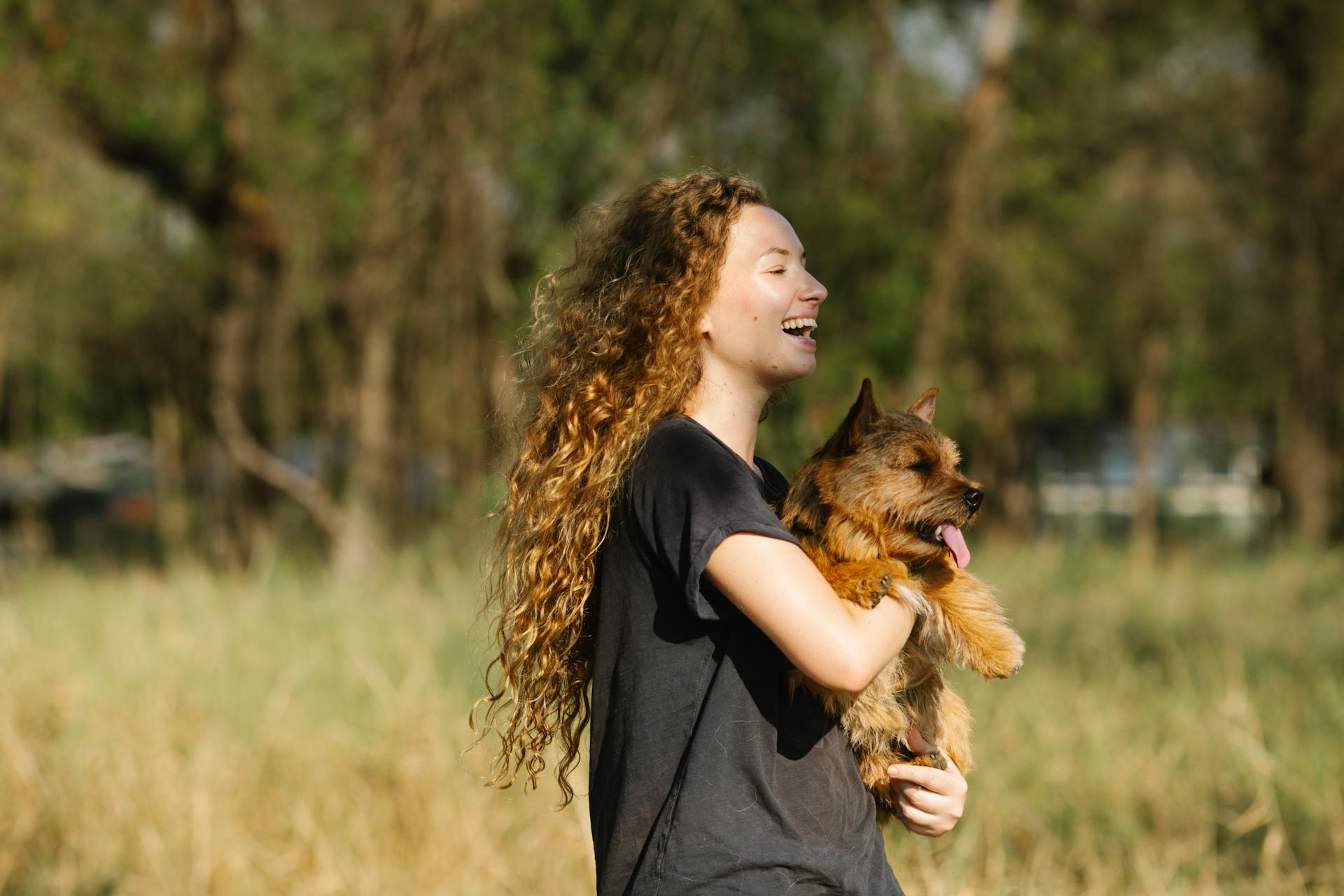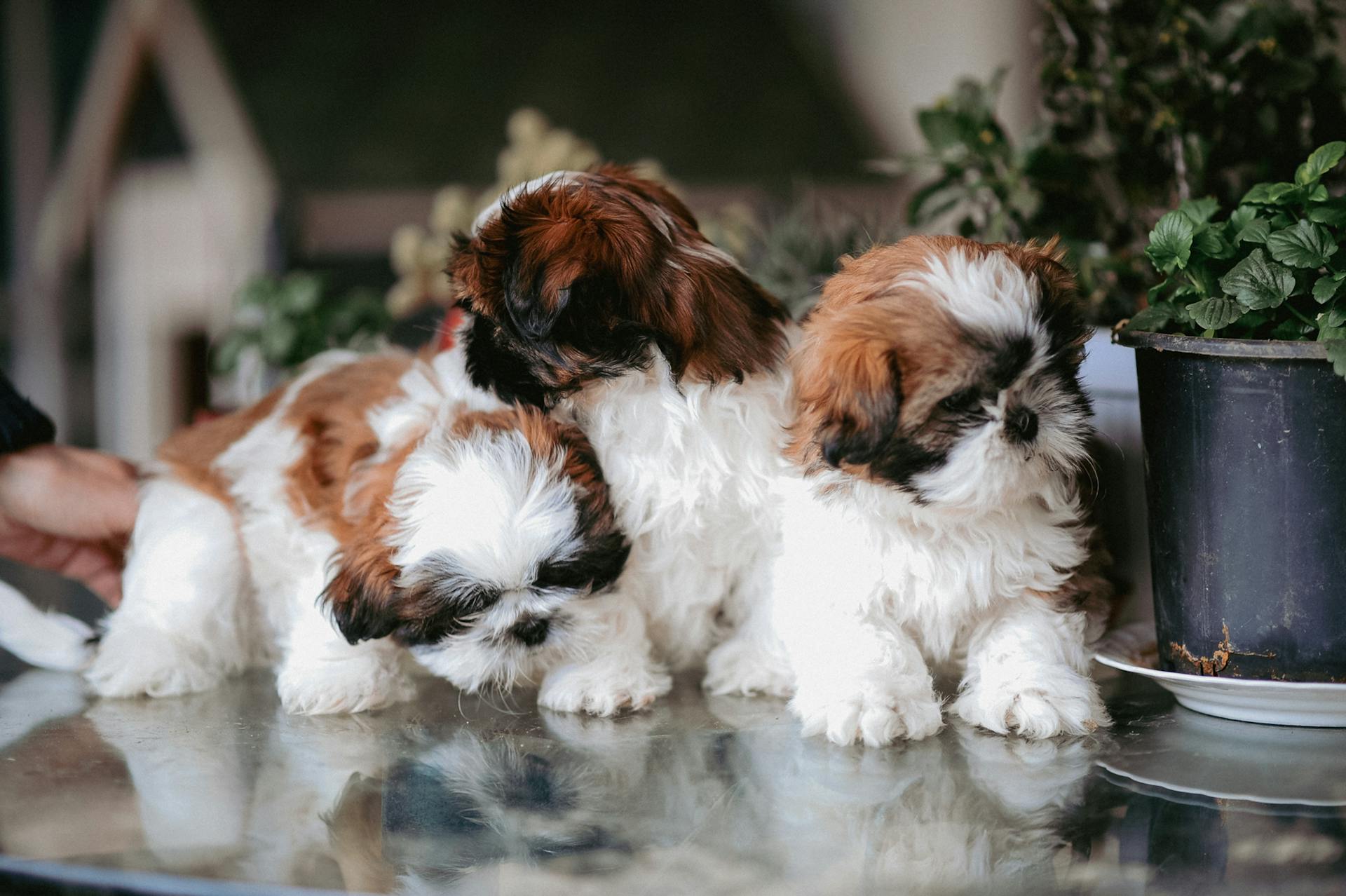
Shih Tzus are known for their friendly and outgoing personalities, but they can be wary of strangers, so proper socialization is crucial.
They typically weigh between 9-16 pounds and stand about 8-11 inches tall.
Shih Tzus are prone to eye problems, including progressive retinal atrophy and cataracts, so regular eye exams are a must.
Their coats require regular grooming to prevent matting and tangling, and they come in a variety of colors, including white, black, brown, and gray.
Temperament and Personality
Shih Tzus are bred to be companions, which means they thrive on human interaction and attention. They love being around people and are happiest when they're at your feet or side.
Their dominant characteristic is affection, and they adore being in your lap. They're quick to form close bonds with their family members.
Shih Tzus are generally wary of strangers and prefer to get to know people on their own terms. This means they need lots of socialization as puppies to become confident and friendly adults.
Broaden your view: Are Shih Tzus Good with Kids
They're usually comfortable with other dogs and pets, as long as introductions are careful. However, they don't tolerate rough play and can be quick to make their feelings known.
To ensure a harmonious household, it's essential to supervise playtime with small children and teach them how to interact gently with dogs.
Here are some key temperament traits to keep in mind:
- Shih Tzus are loyal and loving companions.
- They're alert and lively, and may bark at newcomers to their home.
- They're adaptable and can range from a sedentary lifestyle to a more adventurous one.
- They're great with children and other animals when socialized at a young age.
- They can be stubborn at times and require extra patience when training.
Overall, Shih Tzus are a joy to be around, and with proper socialization and care, they make excellent family pets.
Health and Grooming
Shih Tzus are a relatively healthy breed with a long lifespan of 10-18 years, but they can be prone to certain health issues. They are more likely to develop liver shunts, bone and joint problems, eye problems, kidney disease, and brachycephalic syndrome.
Shedding is minimal, but grooming needs are high. They require daily brushing and combing to prevent tangles, and frequent bathing. Their coat grows continuously and needs to be trimmed and brushed regularly. They also need regular nail trimming, ear cleaning, and face wiping to prevent dirt and tear stains.
Here are some specific health and grooming needs to keep in mind:
- Brush their teeth daily with a dog-safe toothpaste and brush.
- Trim their nails every three weeks.
- Clean their ears weekly with a vet-approved ear cleaner.
- Wipe their face daily to prevent dirt and tear stains.
- Check their eyes regularly for signs of dry eye, glaucoma, or cataracts.
By being aware of these health and grooming needs, you can help your Shih Tzu live a happy and healthy life.
Health Issues
Shih Tzus are generally a healthy breed, but like all breeds, they can be prone to certain health issues. Their average lifespan is 10-18 years.
Some common health issues in Shih Tzus include liver shunts, bone and joint problems, eye problems, kidney disease, and brachycephalic syndrome. These conditions can be quite serious if left untreated.
Liver shunts can cause seizures or stunted growth in Shih Tzus. If you suspect your pup has a liver shunt, ask your vet to test your pooch's blood and conduct an ultrasound liver scan.
Shih Tzus are also prone to bone and joint problems, such as patellar luxation and hip dysplasia. These conditions can cause pain and discomfort for your pup.
Worth a look: Pointer Dog Health Issues
Eye problems are another common issue in Shih Tzus. They can suffer from dry eye, glaucoma, or cataracts, which can lead to blindness if left untreated. Regular eye exams can help detect these conditions early on.
Kidney disease is a serious condition that can affect Shih Tzus. If your pup is showing signs of kidney disease, such as lack of appetite, vomiting, or increased urination, seek veterinary attention immediately.
Brachycephalic syndrome is a condition that affects Shih Tzus with flat faces, causing trouble breathing and overheating. If your pup is experiencing breathing difficulties, seek veterinary attention right away.
Here's a list of common health issues in Shih Tzus:
- Liver shunts
- Bone and joint problems (patellar luxation, hip dysplasia)
- Eye problems (dry eye, glaucoma, cataracts)
- Kidney disease
- Brachycephalic syndrome
Regular veterinary check-ups and a healthy lifestyle can help prevent or manage these conditions.
Skin
Shih Tzu dogs need to be bathed once a week to prevent matting and skin irritation.
Their long coats can easily become matted, causing discomfort and skin problems.
If you notice any changes in your dog's skin, such as redness, flakiness, or dryness, contact your veterinarian for advice.
Size
When considering the physical characteristics of the Shih Tzu, size is a notable aspect. Males and females stand at nine to ten and a half inches tall. This compact stature makes them a great fit for apartment living.
Their weight range is similarly consistent, with most Shih Tzus weighing between nine to 16 pounds.
Grooming and Nutrition
Shih Tzus require regular grooming to prevent matting and tangling of their long, silky coats. Daily brushing is a must, especially for those who want to maintain their beautiful, cascading coat.
Their coats grow continuously, and they need to be trimmed and brushed regularly, even if you keep them short-haired. Shih Tzus need to be brushed every day if you want to do justice to their full, flowing coat.
To keep their coat healthy and shiny, it's essential to brush all the way down to the skin, using a pin brush to reach through all the layers of hair. This will help prevent mats and tangles.
Curious to learn more? Check out: American Bully Coats
Their mustache and topknot require special care, and a fine-tooth comb is ideal for detangling these areas. You can either tie up their topknot into a snazzy little bow or have it trimmed to a more manageable length by a groomer.
Shih Tzus don't shed much, but they still need regular nail trimming every three weeks to prevent overgrowth and pain. Their nails should be trimmed monthly, and their ears checked once a week for dirt, redness, or a bad odor that can indicate an infection.
A healthy diet is crucial for Shih Tzus, and they should be fed a breed-appropriate food twice a day, sticking to the portion size guidelines. Shih Tzus can be fussy eaters, so a combination of dry kibble and a moist food will give them some variety and help keep them healthy.
Here's a list of essential grooming tasks to remember:
- Brush their coat daily to prevent matting and tangling
- Trim their nails every three weeks
- Check their ears once a week for dirt, redness, or infection
- Brush their teeth regularly to prevent dental problems
- Bathe them every three weeks to keep their coat and skin healthy
Regular grooming and a healthy diet will help keep your Shih Tzu happy and healthy for years to come.
Training & Exercise
Training and exercise are crucial for Shih Tzus, and starting early is key. Begin training from 8 weeks old, as they can be strong-willed and have a stubborn streak.
Shih Tzu puppies are naturally curious, so keep training sessions short – around five to ten minutes – to prevent boredom. They can get hyper, so a combination of short walks and games will help expel excess energy and avoid unwanted behaviors.
As a brachycephalic breed, Shih Tzus need plenty of chances to rest and cool down, especially in summer. Aim for 30 minutes to one hour of exercise per day, split into two walks with playtime in between.
Some great games to play with your Shih Tzu include hide and seek, where finding you is the reward, and a "lucky dip" game where you hide their toys at the bottom of a large box filled with mundane filler items.
Shih Tzus are people pleasers and respond well to high-reward treats and positive reinforcement during training. Be sure to count calories from treats, as they can add up fast in a small breed like the Shih Tzu.
Here are some general exercise guidelines:
Remember to switch up your daily routes to provide variety and mental stimulation. With the right balance of exercise, training, and play, your Shih Tzu will be happy and healthy.
Diet
Shih Tzus typically do well with any high-quality commercial dog food. It should be easy to pick up and chew since this breed usually has either an underbite or overbite.
Dry kibble is often the preferred option, but with whatever you choose, be sure to factor in your dog's age for a formula appropriate to their stage in life (puppy, adult, or senior).
You may also choose to make your pup's meals at home, but run the meal plan by your vet to ensure your pup gets all the nutrition they need.
Shih Tzus should be fed two or three times a day, and a diet high in fat and protein with the right balance of Omega-3 and Omega-6 fatty acids can help nourish your pooch's glamorous coat and support muscle mass and joint health.
Limit the treats you give them to avoid excessive weight gain, and check with your vet for the proper mealtime and snack portions.
Here's a recommended daily amount of food for Shih Tzus: 1/2 to 1 cup of high-quality dry food a day.
The quality of dog food you buy also makes a difference - the better the dog food, the further it will go toward nourishing your dog and the less of it you'll need to shake into your dog's bowl.
Intriguing read: Will Shiba Inu Hit 1 Cent
General Information
The Shih Tzu is a small, regal dog with a distinctive face and long, flowing coat. They are known for their friendly and affectionate nature, making them excellent companions and loving lapdogs.
Shih Tzus are highly adaptable and can thrive in various living situations, from apartments in the city to life on a country farm. They love children and get along with other animals, but it's essential to supervise interactions between children and dogs to prevent accidents.
One unique characteristic of the Shih Tzu is their undershot bite, where the lower jaw is slightly wider than the upper jaw, and the upper teeth bite inside the lower teeth. They also have a hypoallergenic coat, which means they shed less and are often a good choice for those with allergies.
You might like: Shih Tzu Teeth
Here are some key characteristics of the Shih Tzu breed:
- Adorable appearance with a distinctive flat face, long flowing coat, and expressive eyes.
- Friendly and affectionate nature, making them excellent companions and loving lapdogs.
- Great with families and children, as they are gentle and patient.
- Low exercise needs, making them well-suited for apartment living and less active households.
- Intelligent and trainable with patience and positive reinforcement.
Overview
The Shih Tzu is a small, regal dog with a distinctive face and long, flowing locks. They have a friendly attitude and a beautiful, yet adaptable personality.
Shih Tzus are highly social dogs that love to meet and greet friends and strangers alike, making them excellent companions. They're great with families and children, and are generally very patient.
One of the unique characteristics of the Shih Tzu is their undershot bite, where the lower jaw is slightly wider than the upper jaw. This can be a bit of a challenge for some owners, but with patience and positive reinforcement, they can be trained.
Shih Tzus have a hypoallergenic coat, which means they shed less and are often a good choice for those with allergies. They're also relatively low-maintenance when it comes to exercise, making them well-suited for apartment living.
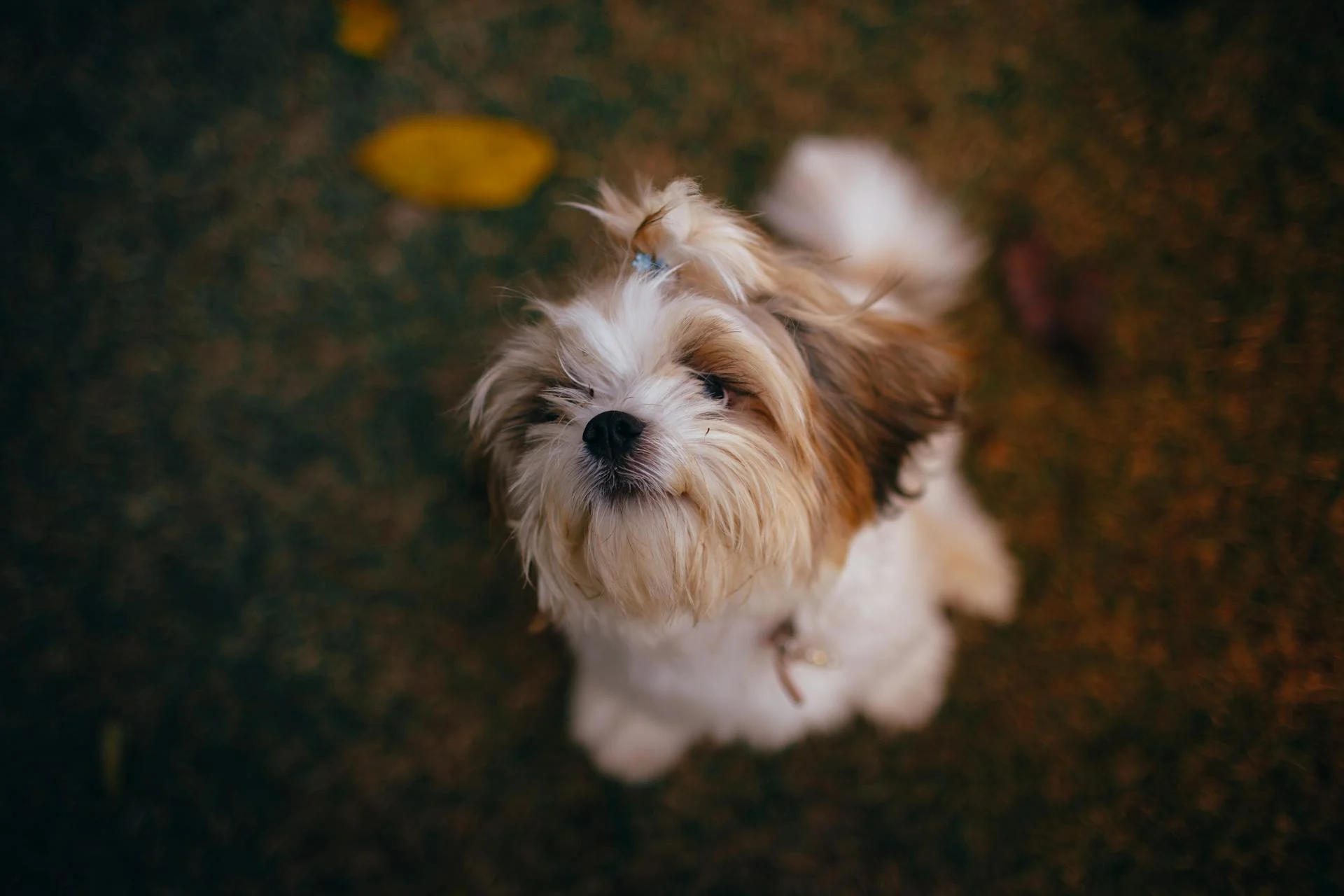
Here are some key characteristics of the Shih Tzu breed:
- Adorable appearance with a distinctive flat face and long flowing coat
- Friendly and affectionate nature, making them excellent companions
- Great with families and children, gentle and patient
- Low exercise needs, well-suited for apartment living
- Low shedding, hypoallergenic coat
- Intelligent and trainable with patience and positive reinforcement
- Historical roots as a breed with royal origins
History
The Shih Tzu breed has a rich history that spans thousands of years. Their earliest ancestors date back to 1000 B.C. in China.
These luxury lapdogs were highly valued by Chinese royalty, who gave them as gifts and kept them as house pets during the Ming dynasty (1368 to 1644 A.D.).
The breed was later developed in Tibet and was later crossed with Pekingese or Pugs in a famous breeding program that was disrupted by the death of its founder, Empress Tzu Hsi, in 1908.
As a result, only seven males and seven females remained, which were used to rebuild the breed. Every Shih Tzu alive today is descended from one of those last 14 pups.
Shih Tzus were introduced to the West through American soldiers who brought them back from overseas in the 1940s and 1950s.
A different take: Straight Backed German Shepherds
Pet Care Considerations
Shih Tzus are social animals that thrive on attention and interaction, so it's essential to spend quality time with them.
They require regular grooming to prevent matting and tangling of their long hair, which can grow up to the ground if left uncut.
Shih Tzus are generally low-maintenance when it comes to exercise, but they still need a 30-minute walk and at-home playtime to stay happy and healthy.
Their brachycephalic nature makes them prone to overheating, so it's crucial to keep them indoors during hot summer weather.
To keep your Shih Tzu at a healthy weight, be mindful of their food intake and ensure they get regular playtime and exercise.
Before Buying or Rehoming a Pet
Before buying or rehoming a pet, it's essential to consider their breed-specific needs and characteristics. Shih Tzus, for example, are bred to be companions and make great family pets who love spending time with their humans.
They tend to get on well with children and other animals, which is a big plus if you have a family or other pets at home. However, their independent streak can make training a bit of a challenge.
To ensure you're getting a healthy and well-cared-for pet, choose a licensed and reputable breeder if you're buying a puppy. Remember, "Lucy's Law" dictates that new puppies or kittens must be bought directly from a breeder or adopted from rescue.
Here are some key things to look for in a breeder:
Shih Tzus, like all dogs, can suffer from a range of health conditions, so it's crucial to look carefully at the veterinary cover provided when shopping around for pet insurance. Not all policies are the same, so don't be afraid to ask questions and compare different options.
For your interest: Why Is My Shih Tzu Itching so Much
Pet Care Considerations
Shih Tzus are happy and sociable dogs that thrive on attention and interaction. They prefer not to spend time alone and can become anxious if left unattended for too long.
Socialization is key for Shih Tzu puppies, as it can help prevent bad behaviors like excessive barking and digging.
A 30-minute walk and at-home playtime are sufficient exercise for this breed, but they do love to be spoiled with attention and treats.
Their long, luxurious double haircoat requires regular grooming to prevent matting and tangling.
Shih Tzus are considered a "hypoallergenic" breed, but they still need regular brushing and bathing to stay clean.
Their brachycephalic face structure can make them prone to overheating, so it's essential to keep them out of hot weather.
Shih Tzus are low-shedding dogs that require less daily exercise than other breeds.
Regular grooming is necessary to keep their coat looking its best and prevent it from dragging on the ground.
Frequently Asked Questions
At what age do Shih Tzu become adults?
Shih Tzus typically reach adult size by 10 months of age. This is a relatively early growth milestone for a small breed dog.
Can Shih Tzu live 20 years?
While 20 years is a maximum life expectancy for a Shih Tzu, with proper care, many can live into their late teens. Regular health checks and a balanced lifestyle can significantly impact a Shih Tzu's overall lifespan.
What does an adult Shih Tzu look like?
An adult Shih Tzu is a small dog that typically weighs between 9-16 pounds and stands 9-11 inches tall. They come in a variety of colors, including solids and bicolor mixes.
At what age do Shih Tzus calm down?
Shih Tzus typically calm down between 1 to 2 years old. This is when they often show reduced puppy-like behavior and increased calmness.
Featured Images: pexels.com
